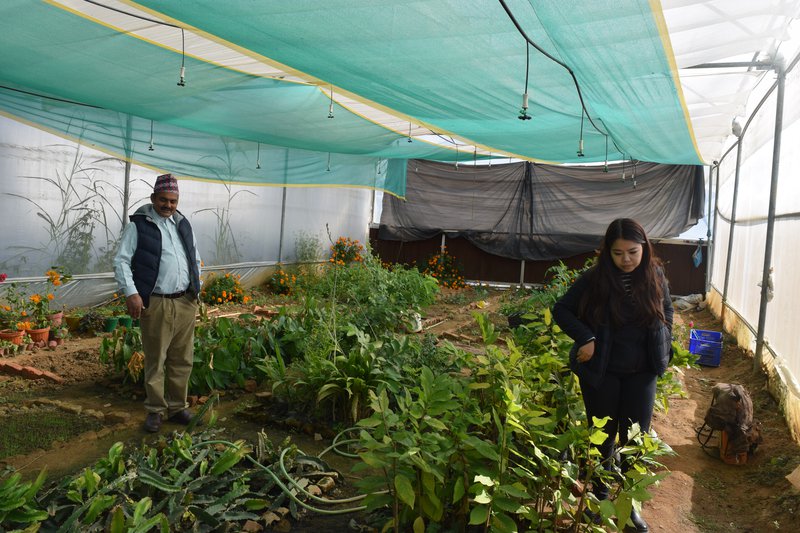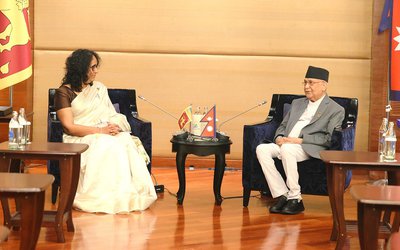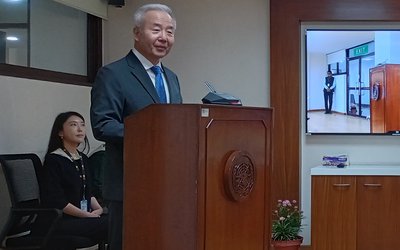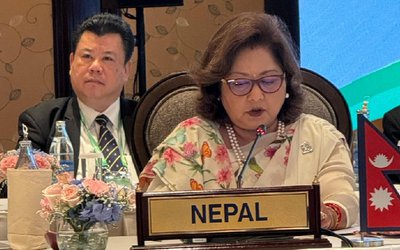

Women farmers in Gela Village, Sarlahi district, have found relief with the establishment of a Milk Chilling Center that connects their production center to the market chain.
The center, supported by Helvetas Nepal's InElam project in collaboration with Hariwan Municipality, began operation on October 22 of this year and has brought about a drastic change.
The opening of the Chilling Center and its connection with the Manglam Diary Factory of the Municipality has been a great relief for Usha Mahato, Chairperson of the Mithila Nari Women Upliftment Agriculture Group.
The partnership between Helvetas Nepal and Hariwan Municipality is proving to be a model for entrepreneurship development.
The women's group was formed by milk-producing farmers who were unable to sell their products due to the unavailability of chilling centers nearby. The Municipality has connected over 600 farmers to a commercial milk production center by providing dairy equipment.
Mahato stated that prior to the center's opening a few months ago, they had cattle at home but lacked nearby facilities and markets. As a result, they had to send their milk far away. The center has made a significant difference in their lives.
Now, women are bringing dairy products ranging from 1 to 5 kilos from morning until evening. After the milk arrives, we store it in a chilling vat. Mangalam Dairy then collects the milk every 2 to 3 days.
Mahato Municipality has partnered with Manglam Dairy to ensure that the milk collected from the villages is sold at the best possible price in the market.
The establishment of a Chilling Center and milk gauging facilities has enabled farmers like Mahato to avoid dumping surplus milk due to the lack of nearby markets and chilling facilities.
In municipal areas, many farmers were giving up this centuries-old profession due to the risks involved in dairy farming. However, the collaboration between Helvetas Nepal’s InElam Project and Hariwan Municipality is changing the situation, and women are returning to the old profession.
Mahato stated that they had been raising cattle for decades, but there were no diaries to sell the milk and no chilling center to store it. Farmers would bring their milk to the chilling center, and the dairy factory would collect it daily. This has completely eliminated the risk of waste. Mahato also mentioned that their income has increased by 10 to 15 percent.
Cattle rearing is one of the most important sources of income and nutrition for rural communities in Hariwan and Madhesh province.
Dairy enterprises provide nutrient-rich milk to rural and urban communities.
The rising urbanization and growing middle class in Nepal, including Hariwan and Madhesh Province, have led to an increase in demand for milk.
Strengthening the efficiency of the Hariwan dairy market can offer significant opportunities for smallholders to expand their milk production and sales.
Villagers in Sarlahi face several obstacles when trying to continue their dairy businesses, including unorganized markets, transportation difficulties, and inaccessible input and extension support services.
The lack of storage facilities incentivizes farmers to mix unsold milk with the next day's batch, leading to higher levels of milk spoilage and contamination, as well as financial losses.
Small-scale dairy farmers face obstacles that make it extremely difficult to increase milk production and make a reasonable profit.

The dairy industry produces curd, cottage cheese, ice cream, and hard cheese for both local consumption and export to foreign countries.
Collaborating with Helvetas-Nepal, we have been doing good work. Improved collaboration between the Municipality, Helvetas Nepal, and entrepreneurs has made livelihoods easier. Entrepreneurs have also created employment opportunities for others. As a result, employment has increased, and entrepreneurs have developed. Keshab Raj Thapa, an ESP and ward chair of the municipality, expressed satisfaction with the higher outcome compared to the investment.
Our collaboration between the InElam Project of Helvetas, local government, agricultural sector, private sector, cooperatives, and Enterprise Service Provider (ESP) has successfully revived the dairy industry, improving the livelihoods of poor and marginalized communities.
Helvetas Nepal's InElam Project has demonstrated exemplary work in generating employment opportunities for women in Karnali and Madhesh Provinces.
In collaboration with local municipalities, entrepreneurs, agricultural cooperatives, and youth entrepreneurs, InElam has implemented several schemes.
Sabal Kumar Singh, General Manager of Manglam Dairy Industry, stated that the project connected their factory with the chilling centers, including Hariwan, which secure milk collection centers for farmers. According to Singh, the establishment of chilling centers is a win-win situation for them.

Instead of working abroad in Malaysia, Thapa took the Enterprise Service Provider (ESP) training and started Krishi Bikash Kendra, which not only sells products but also promotes agricultural development.
" The InElam project decided to support milk producing farmers because they were unable to get market prices due to the unavailability of collection centers in their vicinity," said Hari Gurung, Project Manager of the InElam project of Helvetas Nepal. Our ESP has supported the formation of women's groups, and the community has linked over 600 people to commercial milk production by providing milking equipment.
Helvetas-Nepal's InElam project has shown how a project can support individuals who are deprived of opportunities in Nepal, and even those who are employed and in search of better opportunities go abroad in search of opportunities.
"I am happy to see that dairy farming is coming back and farmers are now rearing cattle. More than half a dozen milk cooling centers are collecting the milk and supplying it to the factory, helping the poor and marginalized farmers to improve their livelihood," said Thapa, ESP.
Singh, Managing Director of Manglam Dairy, said his factory produces high quality hard cheese that is exported to the European market. "We have been producing it with the local milk."
Dairy farming is one of the most important sources of income and nutrition for rural communities in Nepal and Madhesh Province.
"Strengthening the efficiency of Hariwan's dairy market offers great opportunities for smallholder farmers to expand the production and sale of milk," said Hari Gurung, Program Manager of the InElam project. "Helvetas Nepal has supported by investing in the purchase of the milk cooling vat. Our strong cooperation with the community, established by ESP, is a model.
"Farmers have been producing and selling milk to the market for a long time. However, the lack of storage facilities results in higher levels of milk spoilage and contamination, as well as financial losses. Given these obstacles, it is extremely difficult for Madhesh's small dairy farmers to increase milk production and make a reasonable profit," says Akriti Rana of Helvetas Nepal.
This situation began to change in Hariwan Municipality in 2019, when InElam began supporting a group of dairy farming women to form self-help associations and pool their resources and knowledge to improve milk quality and livestock productivity. The women formed the Dairy Products Cooperative: one group per village. Each center received a grant to purchase equipment for storing and testing milk quality.
Although InElam's support is small, the results it has brought to the dairy sector in Hariwan Municipality and Sarlahi District are exemplary.

Keshab Poudel
Poudel is the editor of New Spotlight Magazine.
- FM Dr. Deuba’s India Visit: Mission Aborted
- Mar 26, 2025
- AMBASSADOR MAEDA TORU: Warm Regards
- Mar 24, 2025
- PRO-MONARCHY MOVEMENT: Rising Dissatisfaction
- Mar 23, 2025
- Dr. PRABIN MANANDHAR: Person With Humility
- Mar 16, 2025
- US SUSPESION OF GRANT: Impact On Nepal
- Mar 10, 2025















